
Pyotr Alexeyevich Kropotkin was a Russian anarchist, socialist, revolutionary, economist, sociologist, historian, zoologist, political scientist, human geographer and philosopher who advocated anarcho-communism. He was also an activist, essayist, researcher and writer.

Human rights in the Soviet Union were severely limited. The Soviet Union was a one-party state until 1990 and a totalitarian state from 1927 until 1953 where members of the Communist Party held all key positions in the institutions of the state and other organizations. Freedom of speech was suppressed and dissent was punished. Independent political activities were not tolerated, whether these involved participation in free labor unions, private corporations, independent churches or opposition political parties. The freedom of movement within and especially outside the country was limited. The state restricted rights of citizens to private property.
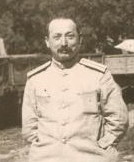
Fyodor Ilyich Dan was a political activist and journalist who helped found the Menshevik faction of the Russian Social Democratic Labour Party.

The Solovki special camp, was set up in 1923 on the Solovetsky Islands in the White Sea as a remote and inaccessible place of detention, primarily intended for socialist opponents of Soviet Russia's new Bolshevik regime. The first book on the Gulag, namely, In the Claws of the GPU (1934) by Francišak Aljachnovič, described the Solovki prison camp.

Benjamin "Ben" Gitlow was a prominent American socialist politician of the early 20th century and a founding member of the Communist Party USA. During the end of the 1930s, Gitlow turned to conservatism and wrote two sensational exposés of American Communism, books which were very influential during the McCarthy period. Gitlow remained a leading anti-communist up to the time of his death.

Soviet dissidents were people who disagreed with certain features of Soviet ideology or with its entirety and who were willing to speak out against them. The term dissident was used in the Soviet Union in the period from the mid-1960s until the fall of communism. It was used to refer to small groups of marginalized intellectuals whose challenges, from modest to radical to the Soviet regime, met protection and encouragement from correspondents and typically criminal prosecution or other forms of silencing by the authorities. Following the etymology of the term, a dissident is considered to "sit apart" from the regime. As dissenters began self-identifying as dissidents, the term came to refer to an individual whose non-conformism was perceived to be for the good of a society. The most influential subset of the dissidents is known as the Soviet human rights movement.
Author and publisher Valery Nikolaevich Chalidze was a Soviet dissident and human rights activist, deprived of his USSR citizenship in 1972 while on a visit to the US.

Jan Kwapiński, born Piotr Chałupka was a Polish independence activist and politician. A member of Combat Organization of the Polish Socialist Party, he was imprisoned by Russian Empire authorities in Warsaw Citadel. After Poland regained independence following the First World War, he became a member of Polish parliament (Sejm) after being elected in 1922 Polish legislative election. He then went on to serve as mayor of Łódź (1939). After being Soviet invasion of Poland arrested by the NKVD, then freed after the Sikorski-Mayski Agreement, he joined the London-based Polish government-in-exile as Deputy Prime Minister and Minister of Industry, Trade and Shipping, later Minister of Treasury.
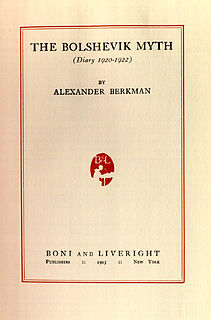
The Bolshevik Myth is a book by Alexander Berkman describing his experiences in Bolshevist Russia from 1920 to 1922, where he saw the aftermath of the Russian Revolution of 1917. Written in the form of a diary, The Bolshevik Myth describes how Berkman's initial enthusiasm for the revolution faded as he became disillusioned with the Bolsheviks and their suppression of all political dissent.
Walter Nelles (1883–1937) was an American lawyer and law professor. Nelles is best remembered as the co-founder and first chief legal counsel of the National Civil Liberties Bureau and its successor, the American Civil Liberties Union. In this connection, Nelles achieved public notice for his legal work on behalf of pacifists charged with violating the Espionage Act during World War I and in other politically charged civil rights and constitutional law cases in later years.

The Rote Hilfe was the German affiliate of the International Red Aid. The Rote Hilfe was affiliated with the Communist Party of Germany and existed between 1924 and 1936. Its purpose was to provide help to those Communists who had been jailed or were imprisoned.
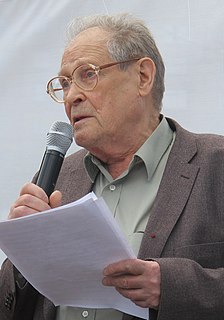
Sergei Adamovich Kovalyov was a Russian human rights activist and politician. During the Soviet period he was a dissident and, after 1975, a political prisoner.

Lev Borisovich Kamenev was a Bolshevik revolutionary and a prominent Soviet politician.

The Workers Defense Union (WDU) was a legal defense organization in the United States, established in New York City in November 1918 to lend aid in cases involving trade union and radical political activists. The group was organized by Industrial Workers of the World organizer Elizabeth Gurley Flynn, working closely with radical trade unionist Fred Biedenkapp. Both would subsequently become active members of the Workers (Communist) Party of America. The WDU became a local affiliate of the American Civil Liberties Union in 1920, with Flynn joining the National Committee of that organization, before finally dissolving as an independent entity in 1923.

The Anarchist Black Cross (ABC), formerly the Anarchist Red Cross, is an anarchist support organization. The group is notable for its efforts at providing prisoners with political literature, but it also organizes material and legal support for class struggle prisoners worldwide. It commonly contrasts itself with Amnesty International, which is concerned mainly with prisoners of conscience and refuses to defend those accused of encouraging violence. The ABC openly supports those who have committed illegal activity in furtherance of revolutionary aims that anarchists accept as legitimate.

The Workers Group of the Russian Communist Party was formed in 1923 to oppose the excessive power of bureaucrats and managers in the new soviet society and in the Communist Party. Its leading member was Gavril Myasnikov.

Karl Johann Kautsky was a Czech-Austrian philosopher, journalist, and Marxist theorist. Kautsky was one of the most authoritative promulgators of orthodox Marxism after the death of Friedrich Engels in 1895 until the outbreak of World War I in 1914.
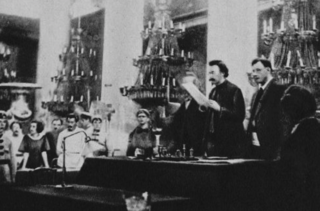
The Trial of the Socialist Revolutionaries was an internationally publicized political trial in Soviet Russia, which brought twelve prominent members of the anti-Bolshevik Party of Socialist Revolutionaries (PSR) before the bar. The trial, which took place in Moscow from June 8 to August 7, 1922, was ordered by Vladimir Lenin and is regarded as a precursor to the later show trials during the Stalin regime.
In the 1980s a human rights movement began to emerge in the USSR. Those actively involved did not share a single set of beliefs. Many wanted a variety of civil rights — freedom of expression, of religious belief, of national self-determination. To some it was crucial to provide a truthful record of what was happening in the country, not the heavily censored version provided in official media outlets. Others still were "reform Communists" who thought it possible to change the Soviet system for the better.
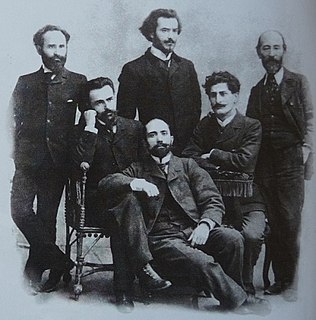
Anarchism in Georgia began to emerge during the late 19th-century out of the Georgian national liberation movement and the Russian nihilist movement. It reached its apex during the 1905 Russian Revolution, after a number of anarchists returned from exile to participate in revolutionary activities, such as in the newly-established Gurian Republic.

















